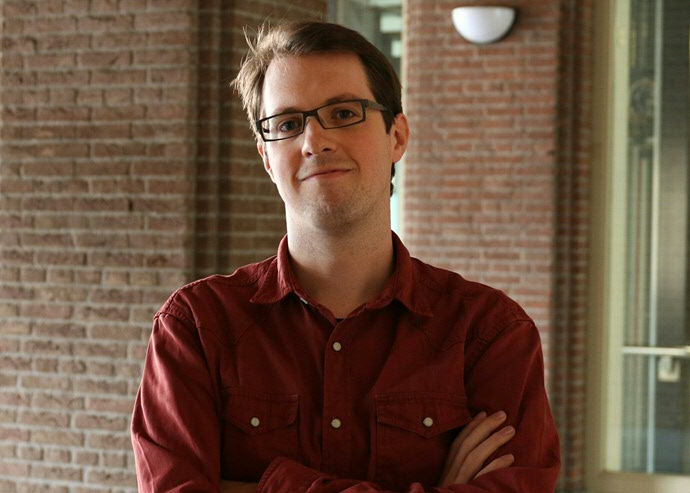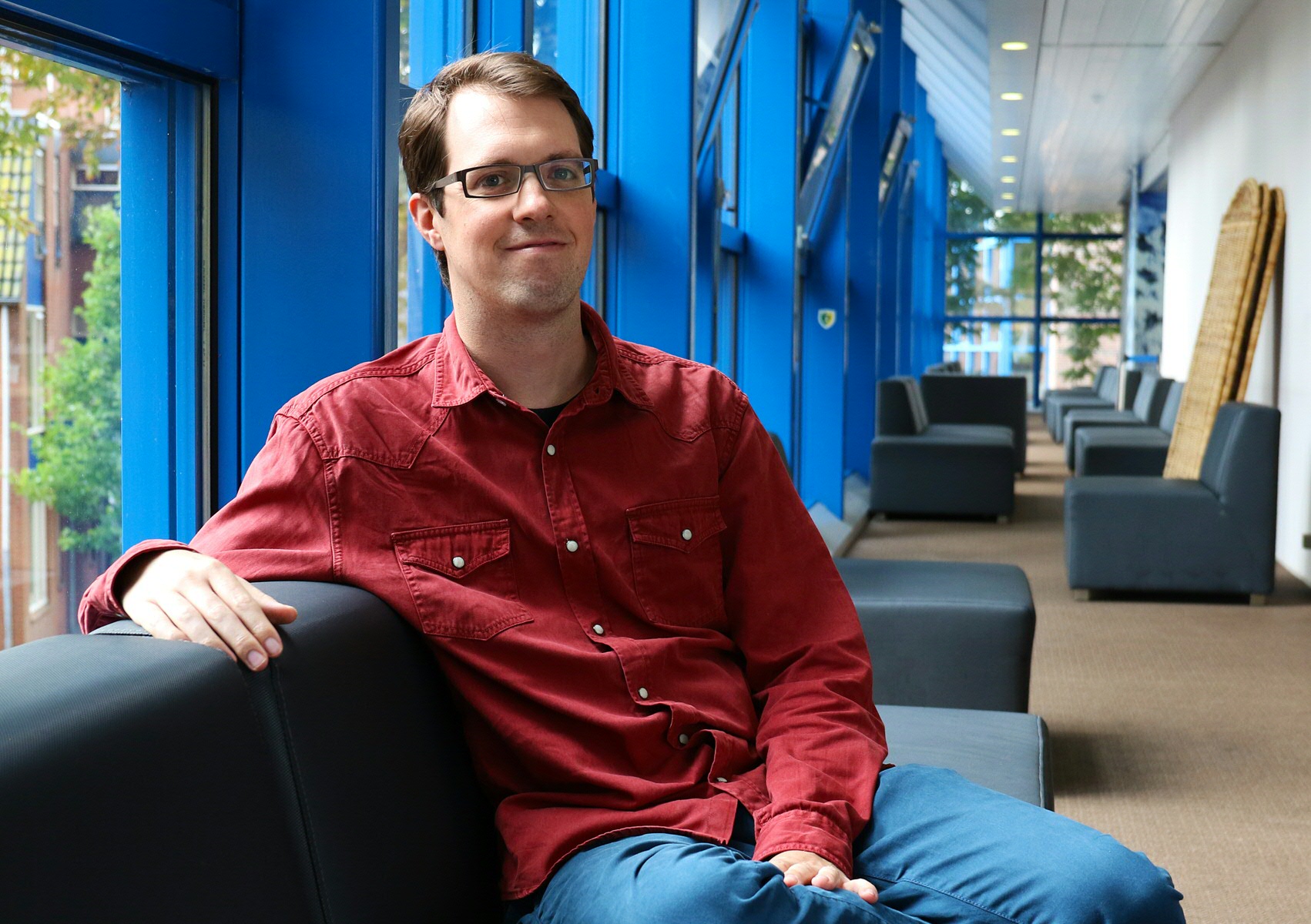From Klokhuis question of the week to a Veni grant

Jorrig Vogels has always been fascinated by language. As a child, he even compared the different words for ingredients on any packaging he came across. Last summer, the language researcher managed to secure a much-coveted Veni grant. ‘There’s something telepathic about language: using language, I can convey an image that I have in my mind into your mind.’
Text: Eelco Salverda, Communication UG / Photos: Hesterliena Wolthuis
Vogels’ love of language began at an early age. At secondary school, he was fascinated by subjects like Latin and Greek, but before that he was a huge fan of the children's TV programme Het Klokhuis. ‘I never missed an episode and was always trying to think up a viewer’s question of the week. I decided that if I was picked, I’d ask something like ‘where do our words come from?’, or ‘why does every language have its own different words?’. I studied the names of the ingredients on packaging too, comparing the words in different languages.’
Eureka
So studying Linguistics was a logical choice for Vogels. ‘How does language work? How do we communicate with each other? That’s what I wanted to know. Preferably combined with data from naturally spoken language. I wanted to test theoretical standpoints against the practical situation.’ Vogels was made for research. After his PhD, he spent two years as a researcher in Germany. ‘I’m hooked on that eureka moment when you discover something new or the penny suddenly drops. For me, the path towards these moments consists of carrying out experiments. But before you can conduct experiments, you spend a lot of time and energy thinking them up. A contradiction that’s always cropping up in experimental research is the matter of controlling or steering a situation. If you don’t, the results can be too widely distributed. But if you do, people tend to be less spontaneous in their use of language and you have to wonder whether that’s really the way they would say something or whether you’ve somehow engineered it. These are the dilemmas and questions that always face a researcher.’
A fast move
Vogels decided to apply for a NWO Veni grant while still in Germany. ‘I had to get a move on because you must apply within three years of being awarded a PhD.’ Much to his amazement, he was successful. ‘There’s a very strict selection process. Only ten percent of applicants are awarded a grant. I didn’t think that my interview with the committee went that well, so I was gobsmacked when I got the good news. In fact, I was already making other plans.’ Vogels didn’t have much time to find somewhere to live in Groningen and arrange an appointment at the UG. He’s the living proof that the life of a young researcher can be anything but predictable. ‘Permanent jobs are few and far between; if you want to do research, you have to rely on grants and scholarships. So I’m delighted to have this Veni grant to fund my next four years of research.’
Conveying images
Vogels will use his grant to study the degree to which people take their listeners into consideration when speaking, particularly when choosing reference words. ‘To my mind, language is inextricably bound up with the outside world rather than being an autonomous system. Visual perceptions, and attention, memory and expectations, all play a part in the words we choose or how we understand the words used by other people. There's something magical about language, almost telepathic: using language, I can convey an image that I have in my mind into your mind. Reference words are important, because we usually talk about the world around us. But how can the person speaking make sure that the person listening understands exactly what he/she is referring to? Do we take our listener's perspective into consideration? Are we sufficiently aware that although we might have a very similar language system, he/she might have very different knowledge and experience of the context?’

Egocentric speakers
Describing the research, Vogels refers to what he calls the ‘egocentrism of a speaker’. ‘Some theories state that we are always subconsciously aware of what the other person knows. I wouldn’t tell my roommate that I'd just had a chat with Pete if that roommate didn't know who Pete was. But increasingly more research is showing that we’re actually not very good at putting ourselves in another person’s shoes. Experiments with pictures, in which the person speaking has more information than the listener, show this quite clearly. If the speaker sees a picture of a big candle and a small candle, and knows that the listener has only seen a picture of the big candle, many speakers will talk about ‘the big candle’, despite knowing that the listener (who's never seen the big candle) is only aware of ‘the candle’.’
Difference in perspective
Until now, many of the experiments involving reference words, such as that and he/she, were carried out without a direct listener, and therefore without interaction, or using people from a particular group with similar information. ‘But this doesn’t leave room for a difference in perspective, and there’s less reason to take someone’s background into account,’ continues Vogels. ‘I’d like to put a student and an 80-year-old together, for example. I’d let them tell each other stories after looking at pictures, and see how each person refers to the pictures. Do they use words like ‘he/she’ or ‘that’, or do they repeat the name of the person?’
Computers and doctors
Vogels’ research is fundamental, but he can also envisage practical applications in the long term. In human-computer interaction, for example. ‘Computers have trouble taking the human perspective into account. But imagine that a Sat Nav system could put itself in the driver’s shoes and take his/her stress into account in heavy traffic. It's also useful to know more about the ins and outs of successful communication in everyday situations, and to be aware of the perspective of the person you are talking to. Take communication between a doctor and a patient, for example.’ ‘Language is a means of bridging the gap between our inner world and the outside world, and between people's individual inner worlds. Watching this in action is fascinating. We all have our own perspective of the world and our own mental and cultural baggage. Yet we still manage to understand each other. The entire process of putting our thoughts into words, formulating sentences, saying them out loud and waiting for the listener to hear and decipher them all takes place within a few hundred milliseconds, and nearly always without a hitch. That’s what I call a miracle.’ Vogels’ work is by no means finished. He never got to ask his question of the week on Het Klokhuis, but how many of those who did would gladly swap their moment of fame for a major research grant..?
More news
-
19 January 2026
Digitization can leave disadvantaged citizens in the lurch
-
13 January 2026
Doing good in complex situations
